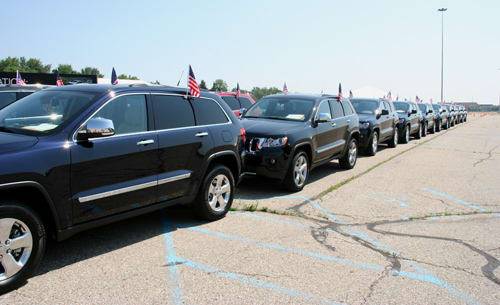Short Supply Causes Some Dealers to Beg for Cars

The recession took its toll on many dealerships. Since early 2009, GM’s dealership body has shrunk by 25%, eliminating or consolidation of 2,064 former dealerships. Chrysler is also in the midst of closing down nearly 800 dealerships. At the same time, the domestic automakers tightened their inventory controls.
Automakers, particularly the Detroit Three, have dramatically reduced their capacity to build new cars in order to right size their businesses. Chrysler and GM, which both went through government-assisted bankruptcies, have slashed their vehicle production by 44% in the case of GM and by nearly 50% for Chrysler. Ford, which didn’t go through bankruptcy, also slashed production by 16%. Even Toyota, a company known for carefully gauging consumer demand, closed down a car plant called NUMMI in Northern California that built Toyota Corollas. This is the first time Toyota has every closed down a plant in its history.
All of these efforts were meant to bring supply in check with demand, which in 2009 was around 10 million cars a year. Now, with increased demand, many automakers are reaching their production limits on some of their most popular cars. Some say sales would be higher this year if there were more capacity for these models.
As our Movers and Losers series shows, SUVs and other recently launched vehicles are hard to catch on a lot before they’re sold. The 2010 Chevrolet Equinox and 2010 GMC Terrain only take 14 to 15 days to sell, even though July’s average number of days it took for a car to sell was 56 days, which is down from 83 days in July 2009.
Chrysler’s new 2011 Jeep Grand Cherokee is flying off of dealer lots (nine days). In fact, more than half of the fastest sellers in July came from GM, Chrysler or Ford.
A lot of this may be because of short-term supply constraints, as is the case with Ford’s 2011 Fiesta. The Fiesta is built in Mexico and a recent hurricane in that region prevented delivery of the new subcompact. The outcome is that Ford’s dealers have less than one Fiesta on their lots on average.
Automakers are trying to fulfill orders, but many are wary of fickle consumer demand. Building a new assembly plant is capital intensive, and once the plant is up and running, an automaker oftentimes has to build a certain output at the plant regardless of consumer demand. This is why Toyota delayed construction of its new Mississippi plant until demand increased.
Some automakers have craftily come up with ways to build more cars without committing to new plants. General Motors, for instance, has started building more of its Equinox and Terrain at a nearby Canadian plant that builds the Impala. Ultimately, the outcome of this is potentially higher prices for consumers, as many dealerships will be unable or unwilling to bargain with their precious inventory.
“We’re in an environment [where car buyers are] probably not going to get the exact [car] they want and they’re going to pay more because the incentives aren’t there,” J.D. Power and Associates’ Jeff Schuster, executive director of forecasting, told Bloomberg Businessweek.
Dealers Beg for Cars as Automakers’ New Discipline Curbs Sales(Bloomberg Businessweek)
Featured stories




